Romania and the Missile Shield
This month the anti-missile defense shield in Deveselu, southern Romania, has become operational.

Bogdan Matei, 20.05.2016, 13:33
The installations in southern Romania are a key element of the European component of the American defense system, protecting collectively NATO members. This includes a land based radar installation in Turkey, four US Navy guided missile ships in Spain, a command center in Rammstein, Germany, and a second land based interceptor station in Poland, scheduled to become operational in 2018. The base in Deveselu is designed to counter possible threats mostly from the Middle East, such as short and medium range missiles recently tested by Iran.
Retired general Alexandru Grumaz, a political analyst, spoke to Radio Romania recently: “I believe it is one of the most important moments in the 25-year history after the 1989 Revolution, on a par with joining the EU and NATO, as two crucial moments in Romanias evolution. This would be the third, as it puts us on the map of European security. In addition, Romania has for the first time obtained firm security guarantees, and is now one of the important NATO members.”
Hosting the inauguration ceremony, PM Dacian Ciolos emphasized that the shield was a major component of the strategic partnership between Romania and the US, in a security climate afflicted more and more often by dramatic changes, threats and risks. Like all officials in Bucharest, the head of government assured everyone that the Deveselu installation was no threat to anyone:
Dacian Ciolos: “This is a means of legitimate defense against ballistic missile threats exclusively. It bolsters NATOs anti-missile defense capability, and expands the area of coverage and protection for south and central European allied states, significantly reducing the risk of possible ballistic missile attacks from outside the Euro-Atlantic space.”
The idea was paralleled by NATO Secretary General Jens Stoltenberg who came to Romania to attend the ceremony. He emphasized the fact that this installation, like that in Poland, was not aimed at Russia, because there are too few interceptors much too far south or too close to Russia to be able to intercept Russian ICBMs. He said the interceptors were designed to answer potential threats of attack with short and medium ranged ballistic missiles from outside the NATO area.
In spite of these statements, Russia harshly criticized the deployment of the shield in Europe, issuing statements according to which this is a threat to its security interests. Kremlin spokesperson, Dmitri Peskov, quoted by Radio Romanias correspondent in Moscow, warned right away that Russia would respond by bolstering its own military capability. Subsequently, President Vladimir Putin himself raised the stakes in the dispute surrounding the system in Romania, and said that Russia would neutralize possible threats. He believes that the shield is meant to weaken his countrys nuclear capability, and promised to increase defense spending.
A few days later, Russia and Belarus, seen by analysts to be the most docile of all of Russias satellites, agreed on a joint response to NATOs deployment of anti-missile defense on their borders. Relations between the West and Russia have gotten cold indeed after Russias annexation of Crimea two years ago, after a so-called referendum, which the international community refused to recognize. The situation further deteriorated after the pro-Russian rebellion in eastern Ukraine. The NATO Secretary General said that the fears expressed by Russia are baseless. He said that his organization believes there is no contradiction between a strong defense, a firm and predictable behavior on the part of NATO, and the attempt to have a dialog with Russia transparently, so as to reduce risks, considering that increased military presence on NATOs borders increases risks of accidents and incidents.
The US President Barack Obama reiterated the worry regarding Russias bellicose stance. Speaking at a recent meeting with Scandinavian leaders, he said that his country was seeking cooperation with Russia, but also wanted to be prepared and strong, encouraging Russia to keep its military activity within the bounds of full compliance with its international obligations. Experts in international law believe that the anti-ballistic shield is in full compliance with the UN Charter and arms control provisions.






























